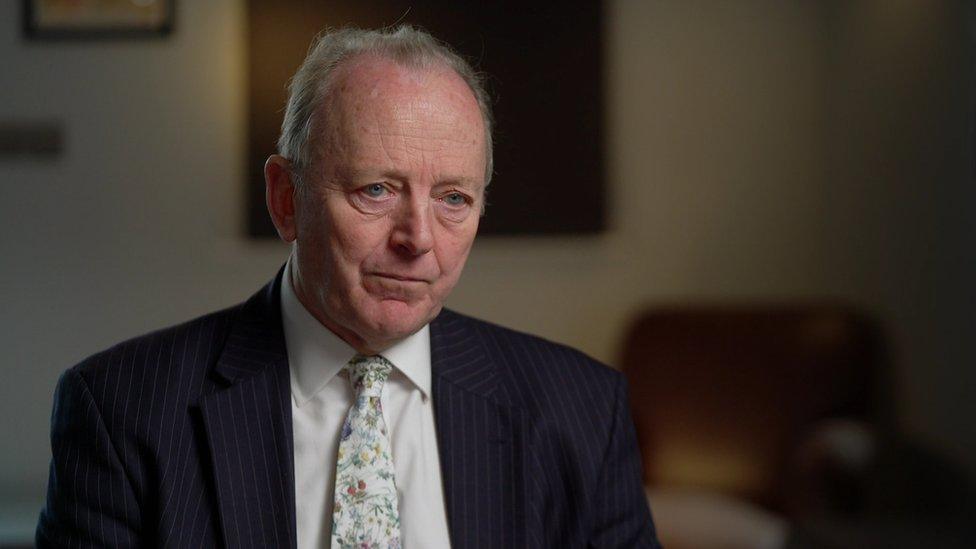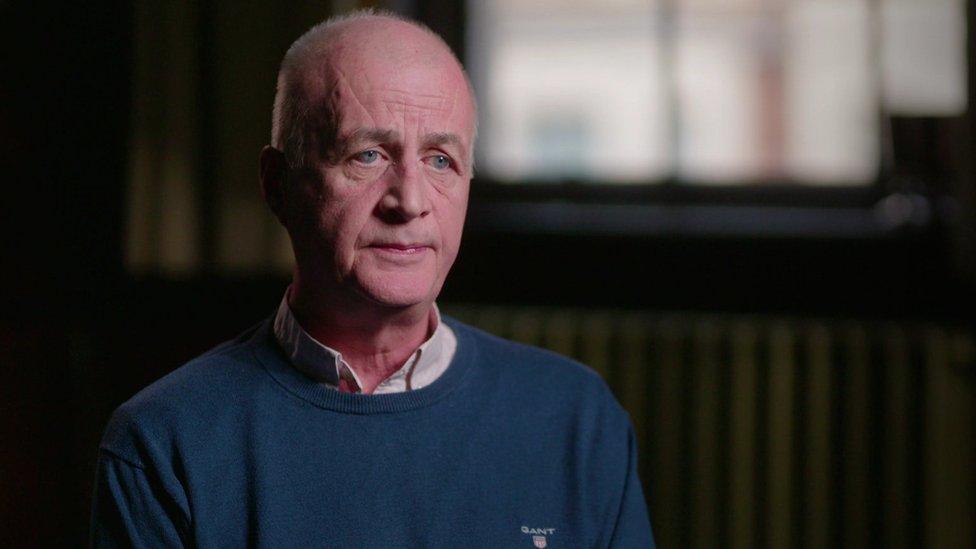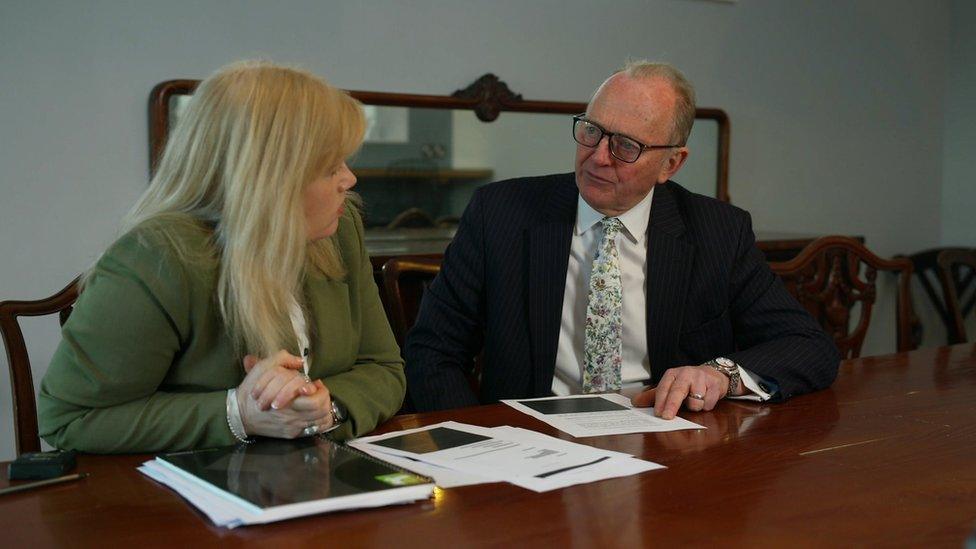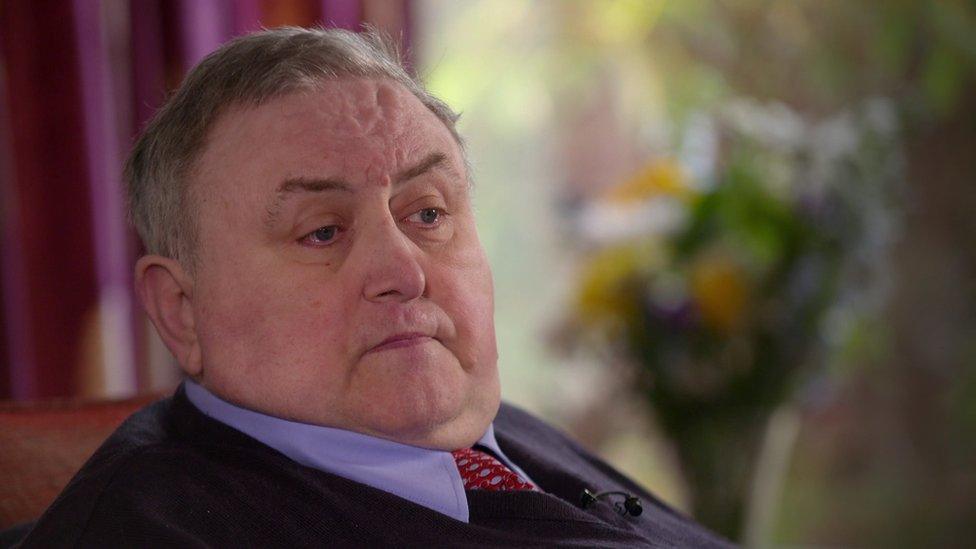Spotlight: PSNI surveillance shortcomings branded recipe for disaster
- Published

Sir Hugh Orde is a former chief constable of the Police Service of Northern Ireland
Shortcomings in secret surveillance of the PSNI's own officers were "a recipe for disaster", former Chief Constable Sir Hugh Orde has said.
Another retired senior officer said there should be a judge-led inquiry into the extent of failings within internal corruption investigations.
BBC Spotlight has looked at the fallout from a bribery investigation that led to officers being arrested or suspended.
It collapsed without criminal charges.
Sir George Hamilton, who led the Police Service of Northern Ireland (PSNI) at the time, said he was "satisfied with the integrity and professionalism of the investigation".
Spotlight has examined failings around the high-profile bribery investigation into multi-million pound police vehicle contracts.
In 2014, eight people were arrested and questioned in connection with the case, including retired Assistant Chief Constable Duncan McCausland and a serving PSNI officer.
The then-Chief Constable of West Yorkshire, Police Mark Gilmore, was suspended.
His home and office were searched although he was not arrested.
No charges were brought against any of the police or civilians caught up in the case.
Mr McCausland and Mr Gilmore complained to the Investigatory Powers Tribunal about secret surveillance in the case.
In December 2022, the PSNI settled the case just before a public hearing was about to start, admitting it had broken its own intelligence rules.
Newforge Country Club source
The police investigation into Mr McCausland and Mr Gilmore had been running for years before the arrests.
It involved secret surveillance, including the interception of personal phone calls by Mr Gilmore.
An employee of Newforge Country Club, a recreation complex in Belfast, claims he was asked by police to spy on the former senior PSNI officers.
There are strict rules regulating the use of intelligence sources that require police to review members of the public who provide them with information more than three times.
In 2022 the PSNI conceded this did not happen in the case of the Newforge source.

Tim Hanley described the use of secret surveillance as "a juggernaut"
Police handlers spent thousands of pounds on him, buying gifts and meals in upmarket restaurants, as well as bringing him to Ulster Rugby games.
Police had nearly 70 meetings with the source and called him more than 700 times, according to Mr McCausland and Mr Gilmore's solicitor.
The most senior detective in Northern Ireland at the time of the bribery investigation told Spotlight he had concerns about the way the case had been conducted.
Former Det Ch Supt Tim Hanley said: "I think the term I used was 'system chaos'.
"I would describe it as like a juggernaut, and nobody wanted to put their foot on the brake."
Spotlight also uncovered extracts from a report by the Surveillance Commissioners issued in 2016.
The report extract does not refer directly to the bribery investigation but said some spying on police officers had "no external oversight".
It also said the Covert Authorities Bureau, the gatekeeper for secret surveillance, was "totally unsighted" on some internal PSNI cases.

BBC Spotlight spoke to Sir Hugh Orde about the 2016 report
Former PSNI Chief Constable Sir Hugh Orde told the programme that without such checks and balances in place you have "run a coach and horses through the Regulation of Investigatory Powers Act".
"If you have someone operating out with that check and that balance you have a recipe for disaster," he said.
The Northern Ireland Policing Board, which oversees the PSNI, told Spotlight it was not "made aware of or briefed on" the commissioners' report.
At that time, the board was told the surveillance commissioners "noted the excellence of PSNI practice and procedure but made recommendations of a technical nature".
The PSNI said it developed an action plan to address a recommendation from the 2016 report which it said "was noted as discharged" in a commissioner's inspection the following year.
The BBC investigation has unearthed an evidence trail that suggests the bribery investigation was not the only case where intelligence sources were operating with questionable authority.
Sources have told Spotlight the PSNI's source handling unit was tasking senior police officers and civilians to spy on other officers.
The informants were known as ethical officers.
There is no such classification under the legislation which regulates how public bodies collect intelligence.

An independent inquiry should be held, Alan McQuillan said
Mr McCausland and Mr Gilmore's solicitor, Ernie Waterworth said: "The system does not allow them to be 'ethical officers'.
"If they're working for the good of the organisation in a covert way, they have to be registered and authorised."
In a statement to Spotlight, the PSNI maintained that the use of ethical officers does not fall within the remit of the Regulation of Investigatory Powers Act.
But it also said it no longer used ethical officers.
Former Assistant Chief Constable Alan McQuillan called for an independent judge led inquiry to understand the full extent of police failings.
"The public needs to find out , the Policing Board needs to be assured what went on there, how did it happen because unless you set out honestly and openly to open that up and fix it you don't know it's not going to happen again," he said.
Spotlight - Covert Cops: When Spying Goes Wrong is available on BBC iPlayer.